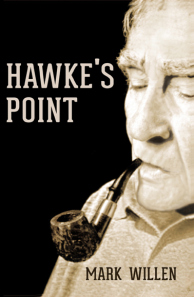The Blog
Almost every day people are forced to choose between right and wrong. Usually these decisions involve minor issues, but sometimes they can be life-altering. Taken together, they define who we are. In Mark Willen’s new novel, Hawke’s Point, an accumulation of decisions, past and present, build characters who hurt, yearn, regret, and still hope as deeply as your wife, your brother, or yourself. They are real, which means as a reader I struggled with them in every choice they had to make.
 The title character, Jonas Hawke, is a retired lawyer who thinks his decision-making days are pretty much over, his caliber, for good or ill, already determined by his past. His wife, Emma, is also settled in her life, having dealt with grief and remorse and found a place in her psyche to contain them. Their son and daughter are working to establish their place in the world as all young adults do. And in Jonas and Emma’s bed-and-breakfast, the live-in cook, Mary Louise, is genially pursuing her two careers, preparing meals by day and entertaining men at night.
The title character, Jonas Hawke, is a retired lawyer who thinks his decision-making days are pretty much over, his caliber, for good or ill, already determined by his past. His wife, Emma, is also settled in her life, having dealt with grief and remorse and found a place in her psyche to contain them. Their son and daughter are working to establish their place in the world as all young adults do. And in Jonas and Emma’s bed-and-breakfast, the live-in cook, Mary Louise, is genially pursuing her two careers, preparing meals by day and entertaining men at night.
For all of them, life is manageable, maybe even good, in the small town of Beacon Junction, Vermont, until two forces rise up to pierce the fragile peace. The first is Steven Delacourt, a young man whose grandfather was the founder of Harrison Health Devices, Inc., a major employer in Beacon Junction, until he was murdered. Steven’s father, Richard, was tried and acquitted of murdering his father-in-law, with Jonas serving as his lawyer. Steven and his mother moved away from Beacon Junction after the trial, and she’s contended that Richard was guilty ever since. Steven comes back to try to find out the truth about his dad and discovers that Jonas and Emma know more than they revealed at the time of the trial.
The second disturbing force is the conscience of Craig Whitney, a man who works at Harrison and is an evening client of Mary Louise. Craig correctly suspects that one of Harrison’s blood vessel stents has a serious problem that should be reported to the FDA. Instead of making the report, Harrison’s officers have chosen to try to fix the problem and keep the matter to themselves. Craig tells the CEO about his concerns, but the CEO assures him everything is under control and tells him not to worry. Craig is not convinced. Not knowing what to do, he tells Mary Louise about his concerns at one of their sessions. Given her connections with some of the influential men in town, she thinks she might be able to generate pressure on Harrison and solve the problem without getting Craig more involved.
Her plan is not as successful as she hoped, and she turns to Jonas for advice.
Once the lid is off, all of Willen’s characters have to decide what to do. Should Jonas and Emma tell Steven what they know about his father? How will their son and daughter react if they learn their parents’ secret? As the mother of two adult sons, I found this dilemma very interesting, although it was one of the more minor considerations in the book. Should Craig report Harrison to the FDA? Should Jonas report Harrison to the FDA? Should Mary Louise keep pushing others to create pressure on Harrison? And eventually, Mary Louise has another critical decision to make when one of her clients asks her to marry him.
Sometimes I agreed with what the characters did and sometimes I didn’t. But I was always intrigued and rooting for them to do the right thing. In this way, Hawke’s Point is haunting. Is anyone ever completely sure they made the right decision? I don’t know if Willen’s characters always made the right decision, but they gave me a lot to think about, and that’s the kind of novel I like. I’ll be thinking about these people for a long time.
Tags: literature, novels
Get in Touch
Follow on Facebook
Follow on Twitter
___________________________________________________
Website Design by Eliza Whitney
 Posts from Late Last Night Books
Posts from Late Last Night Books




Comment
[…] “Almost every day people are forced to choose between right and wrong. Usually these decisions involve minor issues, but sometimes they can be life-altering. Taken together, they define who we are. In Mark Willen’s new novel, Hawke’s Point, an accumulation of decisions, past and present, build characters who hurt, yearn, regret, and still hope as deeply as your wife, your brother, or yourself. They are real, which means as a reader I struggled with them in every choice they had to make… Sometimes I agreed with what the characters did and sometimes I didn’t. But I was always intrigued and rooting for them to do the right thing. In this way, Hawke’s Point is haunting. Is anyone ever completely sure they made the right decision? I don’t know if Willen’s characters always made the right decision, but they gave me a lot to think about, and that’s the kind of novel I like. I’ll be thinking about these people for a long time.” –Sally Whitney, The Blog […]